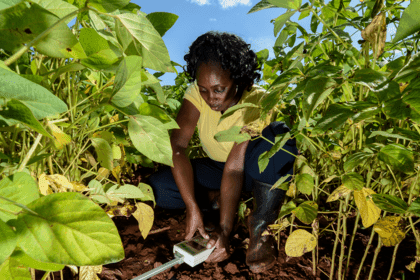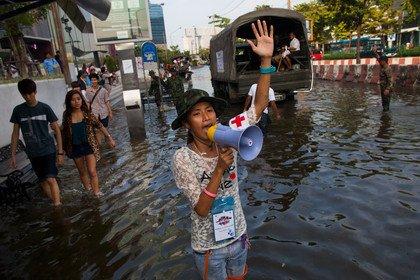
Climate and Health
Our mission is to generate the health evidence for policy action that protects health from climate change.
Melea, Kanem Region, Chad.
Near the village of Melea people irrigate seedlings on the dried lake bed of Lake Chad. Lake Chad, which spanned 9,652sqm in 1963, has shrunk by 90 per cent in recent decades. Climate change is to blame, with population growth and unplanned irrigation also contributing to what the UN calls an 'ecological disaster'. The Great Green Wall is a project spanning 8,000km of Africa from coast to coast encompassing 20 countries. By 2030 the ambition is to restore 100m hectares of degraded land and bring security to one of the most impoverished regions on earth.
Simon Townsley/Panos Pictures
Simon Townsley/Panos Pictures
Melea, Kanem Region, Chad.
Near the village of Melea people irrigate seedlings on the dried lake bed of Lake Chad. Lake Chad, which spanned 9,652sqm in 1963, has shrunk by 90 per cent in recent decades. Climate change is to blame, with population growth and unplanned irrigation also contributing to what the UN calls an 'ecological disaster'. The Great Green Wall is a project spanning 8,000km of Africa from coast to coast encompassing 20 countries. By 2030 the ambition is to restore 100m hectares of degraded land and bring security to one of the most impoverished regions on earth.
Alan Dangour, Director of Climate and Health at Wellcome, shares our vision for a world where catastrophic climate breakdown is averted and human health can flourish.
Melea, Kanem Region, Chad.
Near the village of Melea people irrigate seedlings on the dried lake bed of Lake Chad. Lake Chad, which spanned 9,652sqm in 1963, has shrunk by 90 per cent in recent decades. Climate change is to blame, with population growth and unplanned irrigation also contributing to what the UN calls an 'ecological disaster'. The Great Green Wall is a project spanning 8,000km of Africa from coast to coast encompassing 20 countries. By 2030 the ambition is to restore 100m hectares of degraded land and bring security to one of the most impoverished regions on earth.
Simon Townsley/Panos Pictures
Simon Townsley/Panos Pictures
Melea, Kanem Region, Chad.
Near the village of Melea people irrigate seedlings on the dried lake bed of Lake Chad. Lake Chad, which spanned 9,652sqm in 1963, has shrunk by 90 per cent in recent decades. Climate change is to blame, with population growth and unplanned irrigation also contributing to what the UN calls an 'ecological disaster'. The Great Green Wall is a project spanning 8,000km of Africa from coast to coast encompassing 20 countries. By 2030 the ambition is to restore 100m hectares of degraded land and bring security to one of the most impoverished regions on earth.
Climate change poses a serious and growing threat to our health. But there is hope.
From clean energy to climate-resilient farming practices, there are already evidence-based practical solutions having a positive impact on our health.
And the solutions we develop and scale-up now could have major benefits for human health around the world.
As our climate changes, more people are exposed to extreme heat, floods and droughts. Our continued burning of fossil fuels is also increasing levels of harmful air pollution.
Those most vulnerable to poor health – children, older people and lower-resourced communities – are most at risk.
Our vision is a world where catastrophic climate breakdown is averted in a way that allows human health to flourish. To achieve this, we invest in science, bring people together to solve challenges and support decision-makers to put health at the heart of climate action.

Our mission is to generate the health evidence for policy action that protects health from climate change.
We envision a global society where the health effects of climate change are acknowledged and deeply understood by decision-makers. And where that deep knowledge enables effective policymaking to benefit people across the world.
In our Climate and Health programme, our aim is to transform scientific research into action. Our goal is to establish a robust evidence base that enables decision-makers to protect human health from climate change and support people to thrive.
For example, by better understanding the health impacts of climate change – like how increased heatwaves compromise cardiovascular health and changing climate patterns spread vector-borne diseases – we can better protect vulnerable communities.
By generating novel datasets that combine climate and health data, we can identify actions that are more inclusive, relevant and targeted to the needs of specific communities.
Our funding seeks to accelerate solutions for urgent climate and health challenges. We aim to generate evidence to drive action, improve health outcomes and inform global policy decisions.
We support partnerships that deliver solutions across borders and sectors. We want to build a world where communities, researchers and policymakers are united in prioritising health in climate action.
Through our work we bring together researchers from different disciplines and geographies to ensure effective action. And we believe a diversity of voices and experiences are critical to finding solutions.
Through outstanding research, engagement and partnerships, Wellcome is driving the solutions we need now and for future generations.


